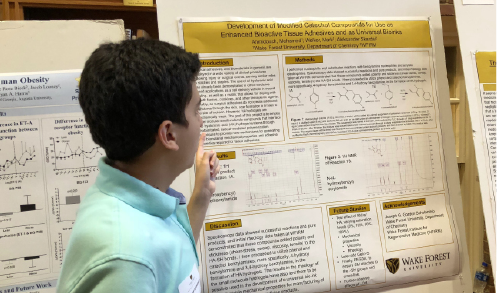Rather than just books and sticker-covered Thinkpads lining the halls of the ZSR, the library was filled with students showcasing their research this past Friday.
On Sept. 28, undergraduate students from many different disciplines were able to present their research to parents, faculty members and peers at the 12th-annual Undergraduate Research Fair.
Students from the English Department, Health and Exercise Science Department, History Department and everything in between formally displayed their work to a crowded room and allowed guests to interact and ask questions as they moved through the room.
The event was hosted by the Undergraduate Research and Creative Activities Center (URECA), which encourages students to find a topic that they are passionate about and pairs them with a faculty mentor to help guide the process.
With 134 posters and presentations, it was difficult to navigate the crowded library, but as soon as a question was asked, students were quick to describe what they had been working on outside of their many daily activities at Wake Forest.
Throughout the year, senior chemistry major James Miller has paired with professors from the WFU School of Medicine to study the effect of alcohol on neuronal signal protein translocation, which is how proteins are transported across a membrane and throughout a cell.
“Basically, we found a mechanism for how alcohol and increasing cholesterol leads to changes in your brain chemistry,” Miller said. “This is a huge pharmacological possibility as an addiction drug so anything that affects cholesterol could be injected and used as an addiction aid.”
While students like Miller are studying change and innovating medical techniques on a molecular level, other students like senior Kelly O’Keefe are integrating social aspects into scientific concepts to impact lives.
With mentors Christina Soriano, the director of the WFU Dance Program, and Christina Hugenschmidt, an assistant professor at the Sticht Center on Healthy Aging and Alzeheimer’s Research, O’Keefe studied how improvisational movement for adults helps with mild cognitive impairment, using a program called IMPROVment.
Soriano and Hugenschmidt both shared the beginnings of their research at last year’s TedX Talks on campus.
“Our research emphasizes physical and mental fitness by encouraging participants to spontaneously respond to auditory prompts,” O’Keefe said. “I spent my summer focused on teaching and co-teaching dance classes in the Parkinson’s community, the dementia community, and a healthy ager’s community.”
After receiving positive feedback and success with this project, O’Keefe decided to remain involved by teaching a monthly dance class this semester. The formal research project will continue as an NIH-funded study to quantifiably prove that this work is improving quality of life with mild cognitive impairment.
Between 2011 and 2017, there have been over 880 research presentations from students, some on campus and some traveling to one of 45 different foreign countries. The number of undergraduate researchers continues to grow, with professors from a variety of fields seeking students to help conduct their studies.
“I think research is so important because sometimes in college you can get in a bubble, and to have opportunities to continue learning about our changing world is so incredible,” said Tori Spong, a senior theatre and sociology double major and recipient of a 2018 Richter Scholarship.
With topics ranging from an overview of French public park functions to the dietary benefits of beet juice, many Wake Forest students are working to learn more about the changing world.










